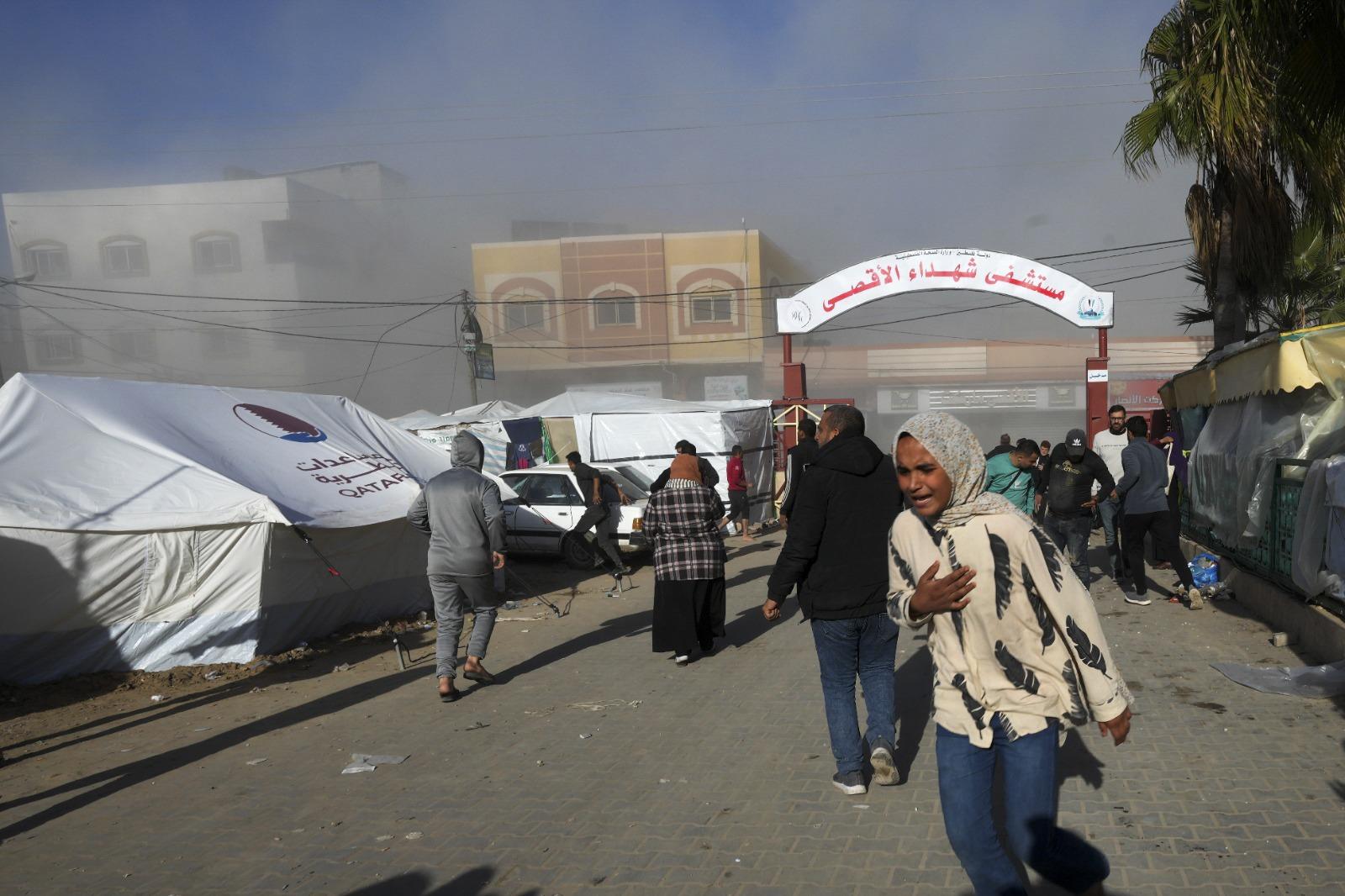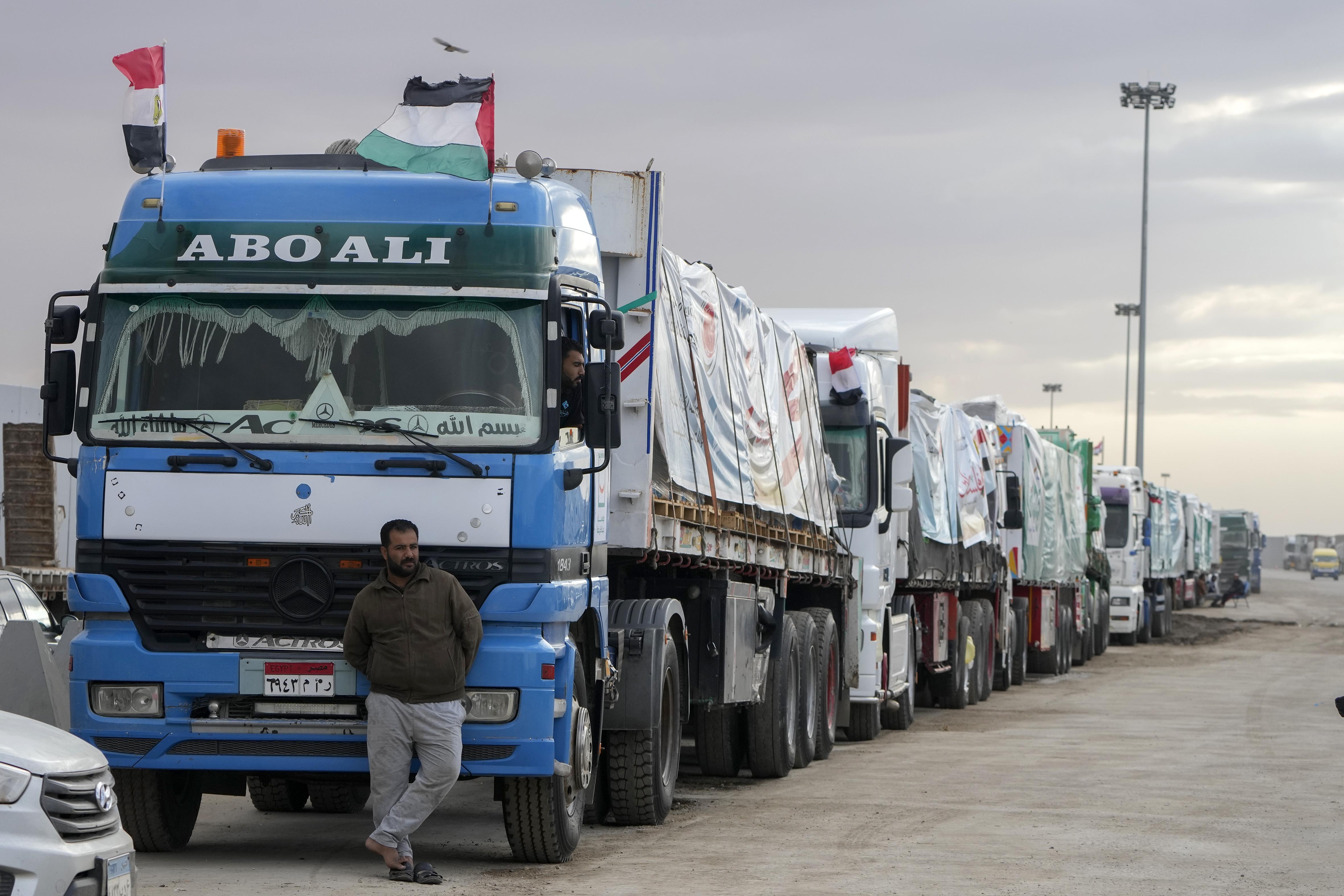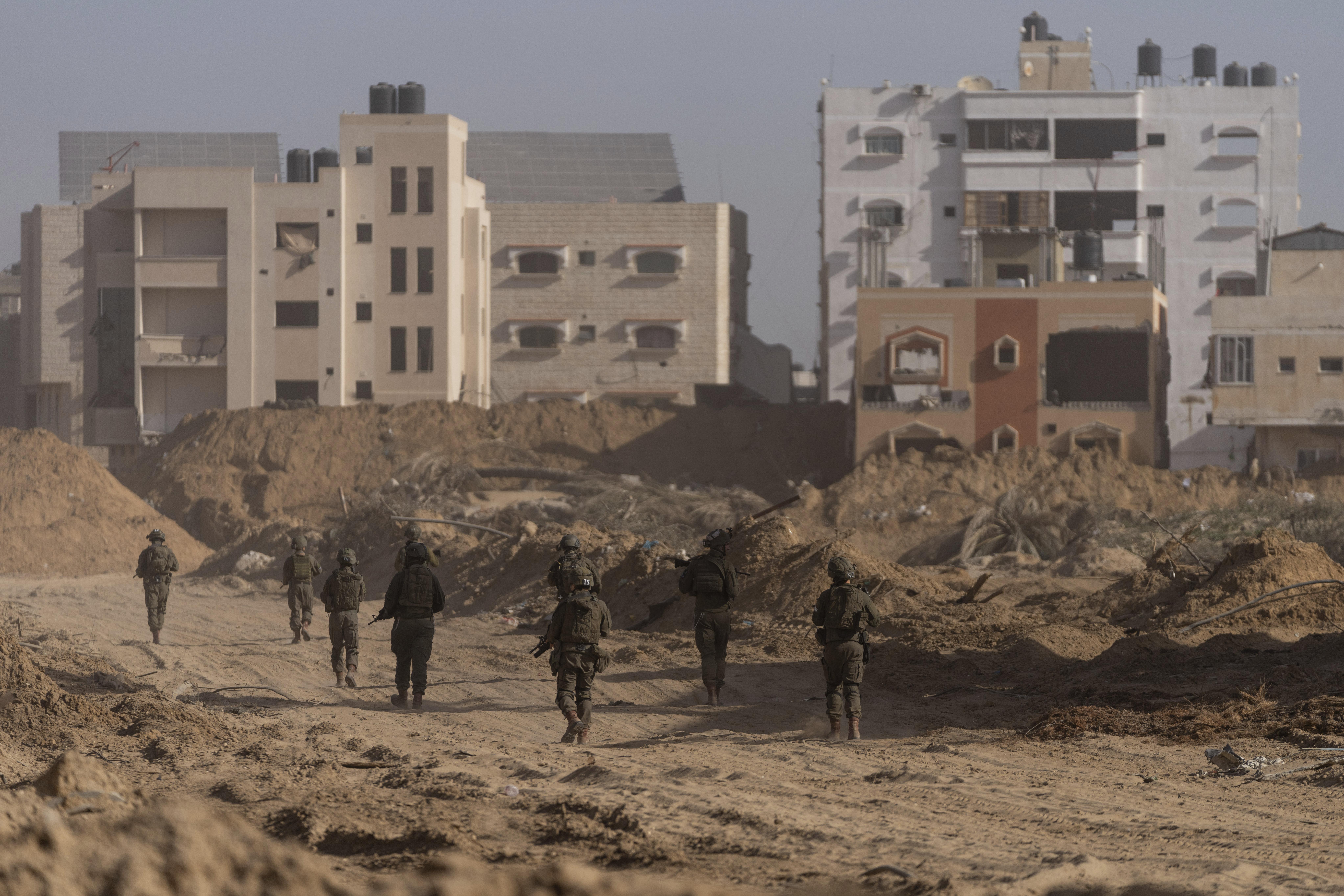 Palestinians run on the Al-Aqsa Hospital grounds moments after an Israeli strike hit a building next to it, in Deir al Balah, Gaza Strip, on Jan 10, 2023. (PHOTO / AP)
Palestinians run on the Al-Aqsa Hospital grounds moments after an Israeli strike hit a building next to it, in Deir al Balah, Gaza Strip, on Jan 10, 2023. (PHOTO / AP)
UNITED NATIONS/JERUSALEM/CAIRO - The United Nations said on Wednesday that Gaza Strip continues to suffer from intense bombardment, which resulted in significant casualties and the destruction of vital civilian infrastructure.
Stephane Dujarric, the spokesperson for UN Secretary-General Antonio Guterres, highlighted at the regular briefing the growing concerns of humanitarian partners regarding access restrictions, particularly in areas north of Wadi Gaza.
"Humanitarian partners are increasingly warning of a potential collapse of health services in Deir al Balah and Khan Younis," he stated. The intensifying hostilities in these regions are causing a spike in casualties, insecurity, and significant barriers to aid delivery.
Obstacles by Israeli authorities prevented UN aid teams from delivering desperately needed humanitarian relief inside Gaza, effectively cutting off five hospitals in the north from access to "lifesaving medical supplies and equipment," the UN Office for the Coordination of Humanitarian Affairs said
The situation has led to a dire shortage of medical resources. "As of yesterday, just one-fifth of the 5,000 beds needed to meet trauma and emergency needs in Gaza are available," Dujarric said.
Moreover, he added that "out of 77 primary health centers, more than three-quarters are not functioning," leaving many without basic health services.
The crisis is also impacting those with chronic and mental health illnesses. "Some 350,000 people with chronic illnesses and about 485,000 people with mental health disorders continue to experience disruptions in their treatments in Gaza," Dujarric expressed with concern.
The conflict has internally displaced approximately 1.9 million individuals, who now face high risks of communicable diseases due to poor living conditions, overcrowding in shelters, and lack of access to water, sanitation, and hygiene facilities. Dujarric mentioned the efforts of humanitarian partners to scale up sanitation services in Rafah and Khan Younis.
He noted that "aid organizations continue to face major operational challenges, including material shortages and logistical difficulties."
ALSO READ: Netanyahu says Israel won't continue occupying Gaza
The severe conditions have also affected water supply. "The combination of water trucking, desalinated water, and the restoration of one of three main water supply lines has yielded just 7 percent of water production in Gaza, compared with the supply before Oct 7," Dujarric said, underscoring the grim reality of the humanitarian crisis in Gaza.
Obstacles by Israeli authorities prevented UN aid teams from delivering desperately needed humanitarian relief inside Gaza, effectively cutting off five hospitals in the north from access to "lifesaving medical supplies and equipment," the UN Office for the Coordination of Humanitarian Affairs said in a statement.
"Requests had been denied five times since Dec 26 to reach the Central Drug Store in Gaza City and Al-Awda Hospital in Jabalia, further north," OCHA said.
 Trucks carrying humanitarian aid line up at the Rafah Border Crossing, Egypt, on the way to Gaza, Nov 19, 2023. (PHOTO / AP)
Trucks carrying humanitarian aid line up at the Rafah Border Crossing, Egypt, on the way to Gaza, Nov 19, 2023. (PHOTO / AP)
Meanwhile, Egypt on Wednesday denied allegations that additional fees are collected at the Rafah border crossing from personnel coming from the besieged Palestinian enclave of the Gaza Strip.
"Only the official fees stated by the Egyptian laws governing the operation of the Rafah border crossing, established by the Land Ports Authority, are collected, and no increase has been applied," said a statement issued by Egypt's State Information Service.
Egypt categorically "refuses to trade the Palestinian brothers or their cause ... in exchange for any financial relief," SIS Chairman Diaa Rashwan was quoted by the statement as saying.
The Rafah crossing between Egypt and Gaza had served as the only gateway for relief supplies into Gaza before Israel reopened its Kerem Shalom border crossing with Gaza in December last year to fast-track the delivery of aid supplies to the enclave.
Gaza has been under a massive Israeli military campaign against Hamas since Oct 7, which has killed 23,357 Palestinians and injured 59,410 others, according to data released by Gaza's health ministry on Wednesday.
Defying international calls for a ceasefire, the chief of staff of the IDF Herzi Halevi, while touring the Bureij refugee camp in central Gaza, said that the army "must continue the effort and destroy the terrorist infrastructure of Hamas."
ALSO READ: WHO warns of humanitarian, health catastrophe in Gaza
 Israeli soldiers walk during a ground operation in Khan Younis, Gaza Strip on Jan 10. 2024. (PHOTO / AP)
Israeli soldiers walk during a ground operation in Khan Younis, Gaza Strip on Jan 10. 2024. (PHOTO / AP)
Despite Israel's promises to decrease the intensity of the strikes, the Israeli strikes have intensified on Wednesday. According to the Israel Defense Forces, about 150 locations were struck over the last day. In Khan Younis, soldiers uncovered an underground tunnel where Hamas held hostages in "inhuman conditions," IDF Spokesperson Daniel Hagari told a press briefing.
Wartime Cabinet Minister Benny Gantz said in a public statement that Hamas has effectively lost control over "large parts of the enclave," adding that Israel needs to continue the fighting. "If we stop now, Hamas will resume its control," he said.
At nightfall, the wartime cabinet convened to discuss a new Qatari proposal for a deal with Hamas, a government official confirmed to Xinhua. The proposal includes the withdrawal of the Israeli forces from Gaza, the departure of Hamas leaders from the Palestinian enclave and the release of the hostages held by Hamas and other militants in Gaza.
Osama Hamdan, a senior Hamas official, said at a press conference in Beirut that the group will not agree to any deal that won't include a complete cessation of fighting.
 This photo taken on Jan 9, 2024 shows a meeting of the UN General Assembly discussing the United States' veto on Gaza in the Security Council the previous month, at the UN headquarters in New York. (PHOTO / XINHUA)
This photo taken on Jan 9, 2024 shows a meeting of the UN General Assembly discussing the United States' veto on Gaza in the Security Council the previous month, at the UN headquarters in New York. (PHOTO / XINHUA)
In addition, the UN General Assembly on Tuesday convened to discuss the United States' use of its veto power in the Security Council the previous month.
UNGA President Dennis Francis emphasized that "saving civilian lives" should be the foremost priority in Gaza.
UNGA Vice-President Cheikh Niang of Senegal, wielding the gavel in the General Assembly Hall and acting as deputy for Francis, delivered a statement on his behalf.
Francis urged all warring parties in Gaza to "fully implement" the council resolution as well as the UNGA resolution of Dec 12 calling for a ceasefire, arising from the UNGA's reconvened Emergency Special Session.
On protecting civilians, Francis urged all member states "to keep this shared goal to the forefront during today's debate."
In the wake of the Ukraine crisis in early 2022, the UNGA adopted a resolution designed to foster greater cooperation with the Security Council.
Tuesday's meeting came on the heels of the US vetoing on a Russian amendment prior to the successful passing of last month's council resolution on Gaza
The resolution stipulates that whenever a veto is exercised in the Security Council, it automatically initiates a meeting and debate in the General Assembly to examine and deliberate on the action.
The veto is a special voting power held by the permanent member states on the council, whereby if any one of the five -- China, France, Russia, Britain and the United States -- casts a negative vote, the resolution or decision automatically fails.
The UNGA resolution which introduced this extra scrutiny calls on the UNGA president to convene a formal debate within 10 working days, so that the 193 members of the wider body can have their say.
The intention behind it is to give UN member states the chance to make recommendations, which could include the use of armed forces, to maintain or restore peace and security on the ground.
Tuesday's meeting came on the heels of the US vetoing on a Russian amendment prior to the successful passing of last month's council resolution on Gaza.
The Security Council on Dec 22 passed a key resolution, emphasizing the immediate acceleration of aid deliveries to the distressed civilians in Gaza, but without the original call for an "urgent suspension of hostilities" between Israel and Hamas.
ALSO READ: US veto slammed as UN chief regrets failure to seek Gaza truce
Riyad Mansour, permanent observer of the Observer State of Palestine to the UN, said that he was standing before the UNGA "representing a people being slaughtered, with families killed in their entirety, men and women shot in the streets, thousands abducted, tortured and humiliated, children killed, amputated, orphaned -- scarred for life."
He said "no people" should have to endure such violence and it must stop.
No one can understand that the Security Council is still being prevented from calling for an immediate humanitarian ceasefire, he added, while 153 states in the General Assembly have called for just that, along with UN Secretary-General Antonio Guterres.
Israel's assault is without precedent in modern history, he said, calling it "a war of atrocities." During these last 90 days, 11 Palestinians have been killed every hour, including seven women and children, he told the UNGA.


